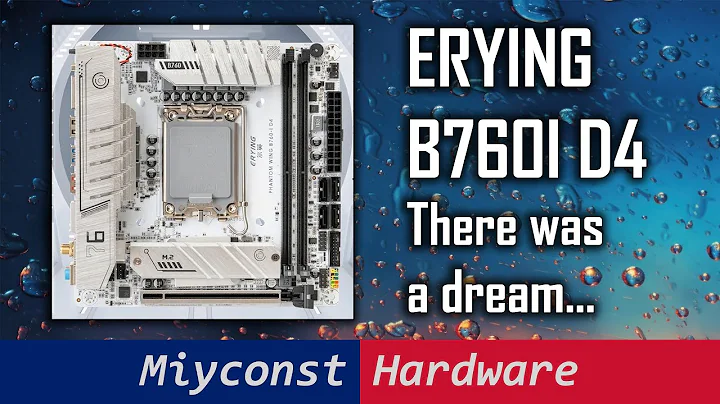Unleash the Power with MCS 251 Microcontroller
Table of Contents:
- Introduction to MCS 251 Microcontroller
- The Background of MCS 251 Microcontroller
2.1 What is a Microcontroller?
2.2 The Evolution of Microcontrollers
2.3 Intel's Introduction of MCS 251
- Features and Architecture of MCS 251 Microcontroller
3.1 Von Neumann Architecture
3.2 Core Components of MCS 251
3.3 Performance Upgrades of MCS 251
- Advantages of MCS 251 Microcontroller
4.1 Increased Performance
4.2 Enhanced Functionality
4.3 Efficient C Language Support
- Applications and Impact of MCS 251 Microcontroller
5.1 Small Consumer Electronics
5.2 Embedded Systems
- Upgrading to MCS 251 Microcontroller
6.1 Compatibility with MCS 51
6.2 Plug and Play Replacement
- Conclusion
- Resources
Introduction to MCS 251 Microcontroller
The MCS 251 microcontroller is a powerful and versatile digital controller that combines a processor core, memory, and programmable input-output peripherals on a single integrated circuit. In this article, we will explore the background, features, advantages, and applications of the MCS 251 microcontroller. We will also discuss the process of upgrading to MCS 251 and its impact on digital devices.
The Background of MCS 251 Microcontroller
Before diving into the details, let's understand the concept of a microcontroller. A microcontroller is a small computer on a single chip that integrates a processor core, memory, and input-output devices. Its compact size and cost-effectiveness make it an ideal choice for various digital applications.
The MCS 251 microcontroller was introduced by Intel in 1994 as a significant upgrade to its MCS 51 architecture. The MCS 251 incorporated a new core design with pipelined instruction execution, 24-bit addressing, and a registered base CPU. These advancements resulted in up to 15 times higher performance compared to the original MCS 51 microcontroller. Additionally, the MCS 251 offered increased memory, enhanced instruction set, low power consumption, high-level language support, and improved integration.
Features and Architecture of MCS 251 Microcontroller
The MCS 251 microcontroller family represents a major upgrade from the widely used MCS 51 8-bit microcontroller. Despite the advancements, it maintains binary code compatibility with the MCS 51, minimizing the impact on existing hardware and software. The MCS 251 microcontroller follows the von Neumann architecture, which features pipelining for flexibility and simplicity.
The core of the MCS 251 microcontroller comprises the CPU, clock, and register unit. It also includes essential components such as memory, peripherals, timers/counters, watchdog timers, PCAs, and I/O ports. The CPU fetches instructions from the chip memory and sends them to the execution unit. The clock and reset serve as timing sources for the microcontroller, while peripherals perform specialized functions outside the core.
Advantages of MCS 251 Microcontroller
The MCS 251 microcontroller offers several advantages over its predecessor and other microcontrollers in the market.
Increased Performance: With its pipelining features, the MCS 251 microcontroller achieves up to 15 times faster execution compared to the MCS 51. This boost in performance is crucial for demanding applications, such as cell phones, scanners, and transmission systems.
Enhanced Functionality: The MCS 251 microcontroller provides a higher level of integration, enabling the development of advanced and feature-rich devices. It offers increased memory space, efficient C language support, and an enhanced instruction set that simplifies the design process.
Efficient C Language Support: The MCS 251 microcontroller is well-suited for embedded applications due to its efficient support for the C programming language. This allows developers to write code with reduced size and complexity, resulting in optimized performance.
Applications and Impact of MCS 251 Microcontroller
The MCS 251 microcontroller finds applications in various digital devices, particularly in the consumer electronics and embedded systems sectors.
Small Consumer Electronics: The MCS 251's compact size and cost-effectiveness have made it an integral part of small electronic devices like mobile phones and handheld scanners. Its high performance and efficient power consumption contribute to the overall functionality of such devices.
Embedded Systems: The MCS 251 microcontroller provides a reliable and powerful solution for embedded systems, which require both advanced functionality and compact size. It enables the development of smart and interconnected devices that are widely used in industries like automotive, industrial automation, and home appliances.
Upgrading to MCS 251 Microcontroller
Upgrading to the MCS 251 microcontroller from MCS 51 is a seamless process.
Compatibility with MCS 51: Despite its advanced features, the MCS 251 microcontroller maintains compatibility with the MCS 51 microcontroller. This ensures that existing hardware and software designed for MCS 51 can be easily adapted to the new architecture.
Plug and Play Replacement: Upgrading to the MCS 251 microcontroller is as simple as plug and play. By removing the old MCS 51 microcontroller and replacing it with an MCS 151 or MCS 251, users can quickly benefit from the improved performance and features.
Conclusion
The MCS 251 microcontroller represents a significant stride in microcontroller technology. Its high performance, enhanced functionality, and compatibility with existing systems make it a popular choice for developers. The advent of MCS 251 has led to the production of inexpensive and more powerful electronic devices, which have revolutionized various industries. As technology advances further, we can expect microcontrollers to continue growing and improving, enabling a new generation of intelligent and efficient digital devices.
Resources
- Intel MCS 251 Microcontroller Datasheet - [Link]
- MCS 251 Programming Guide - [Link]
- Microcontrollers for Embedded Systems - [Link]
FAQ
Q: What is the MCS 251 microcontroller?
A: The MCS 251 microcontroller is a compact and powerful digital controller that integrates a processor core, memory, and programmable input-output peripherals on a single chip.
Q: How does the MCS 251 differ from the MCS 51?
A: The MCS 251 microcontroller offers significant advancements over the MCS 51, including increased performance, enhanced functionality, and efficient C language support.
Q: What are the applications of the MCS 251 microcontroller?
A: The MCS 251 microcontroller finds applications in consumer electronics, such as cell phones and scanners, as well as in embedded systems used in industries like automotive and industrial automation.
 WHY YOU SHOULD CHOOSE TOOLIFY
WHY YOU SHOULD CHOOSE TOOLIFY

























